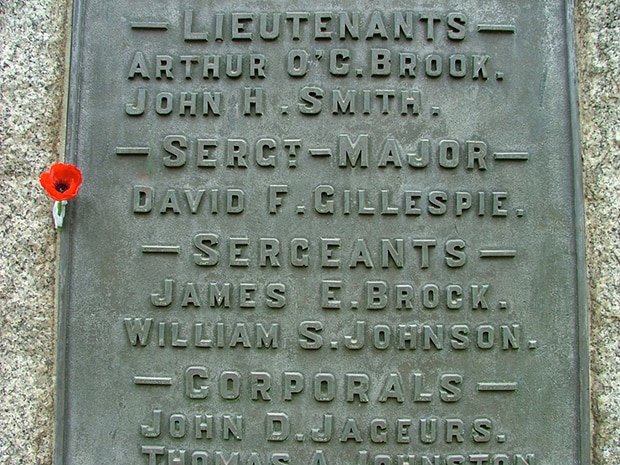Company Sergeant Major David Francis Gillespie
59th Battalion
Died Caulfield, Australia
March 27, 1917, aged 28 years
Five games for Carlton, 1907-1908
David Gillespie was born in the Royal Melbourne Zoo, where his mother was employed to run the kiosk. He preceded his twin brother Doug on December 13, 1887, and the pair would later play for Carlton – a feat emulated only by the Hanton twins Hal and Alex, who represented the Blues in the mid-1940s.
Over the next 11 years David’s and Doug’s parents, Glaswegians James Gillespie and Mary Gallagher, would raise another three sons and three daughters as the clan settled in the Carlton district. Doug and David each pursued their respective careers – Doug as a gardener, David as a constable of police – and David would follow Doug from the Gillespie home in Gatehouse Street to the Carlton ground on Royal Parade.
When David’s father died in 1913, his mother Mary was left to fend for her eight children. A year later, following the outbreak of World War I, Mary was then placed in the harrowing position of having to farewell each of her five sons, for all of them answered the call.
Sergeant Doug Gillespie, a gardener by profession, was 26 years old when he enlisted in December 1914. Promoted to sergeant in Egypt in March 1916, he was later struck down with illness and transferred to France in June 1917, before securing leave to Australia in December the following year.
All five Gillespie brothers – Doug, Gordon, Robert, William and David – were struck down with serious illness or wounded. David fatally.
As with his twin brother Doug, David was an early volunteer for front line military service. Upon joining the 59th battalion, he soon found himself a part of the ill-fated Gallipoli campaign.
Having somehow survived the campaign, the now-promoted Sergeant followed his battalion into the unspeakable horror that was trench warfare on France’s Western Front. It was March 1916, and by the following May, David’s outstanding leadership qualities were again acknowledged, with a further promotion to the rank of Company Sergeant-Major.
But his all-too-short existence was nearing its tragic end.
On July 19, 1916, David was leading his men in an assault on German positions near Armentieres when an artillery shell exploded close behind him. Shrapnel tore into his lower back and one arm, inflicting grievous injuries.
Miraculously still alive, David was evacuated to a hospital behind the lines and quickly repatriated to England. A series of operations followed, but it was obvious that his spinal cord had been shattered, and his stomach and intestines were irreparably damaged.
Returning to Melbourne aboard the hospital ship Wiltshire on the eve of the New Year – December 31, 1916 – the mortally wounded soldier was slowly stretchered down the gangway. From there he was taken to Caulfield Military Hospital where, despite the best efforts of the medical staff, he succumbed to peritonitis.
David Gillespie died in the Australian General hospital in Caulfield, on March 27, 1917. The Carlton Football Club was well-represented when David was laid to rest with full military honours at Coburg cemetery, and the players wore black armbands in tribute at their next match.
A little under seven years later, David’s grieving mother Mary was laid to rest in the same grave.
A touching memorial (below) to David Gillespie (and other soldiers of the district lost in wartime) stands on tranquil ground on Royal Parade, not far from the Carlton ground where he and twin brother Doug once played.

An inscription at the base of that memorial says simply: WE DIED FOR COUNTRY, LIVE YE FOR IT.



